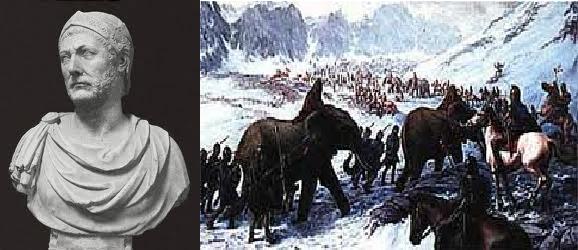Week 4
Often regarded as the greatest military tactician and strategist in European history, Hannibal would later be considered one of the greatest generals of antiquity, together with Alexander the Great, Julius Caesar, Scipio, and Pyrrhus of Epirus. Plutarch states that, when questioned by Scipio as to who was the greatest general, Hannibal is said to have replied either Alexander or Pyrrhus, then himself, or, according to another version of the event, Pyrrhus, Scipio, then himself. Military historian Theodore Ayrault Dodge once famously called Hannibal the "father of strategy", because his greatest enemy, Rome, came to adopt elements of his military tactics in its own strategic arsenal. This praise has earned him a strong reputation in the modern world, and he was regarded as a great strategist by men like Napoleon Bonaparte and the Duke of Wellington.
RECOMMENDED READING
We have two great books about Hannibal, one by our very good friend Patrick Hunt from Stanford who has been investigating the route that Hannibal took into Italy for many years. Every year, Patrick takes a group of Stanford students with him to northern Italy and they go to work on their archaeological project to find traces of the Hannibal trip through the Alps. It is a great story both of Hannibal and of Patrick's work with these students. National Geographic is following the project and writing about it. Patrick's new book is great. David Durham has written a good book too especially about Carthage versus Rome. They are both worth reading.
Here are Professor Hunt's comments about this wonderful book: "I am passionate about this book because Hannibal has consumed almost a third of my life: 25 years tracking him across Europe and the Mediterranean, intensely studying his tactics and maneuvers in the very places he conducted his campaigns, standing on the steep scarp of the Alps looking down into Italy, walking back and forth across his battle sites, and especially noting how much Spain meant to him: Spain where he grew up and trained under his father and provided Hannibal's Iberian silver that financed his campaigns in the gathering of military intelligence in world-changing stratagems and paid his professional mercenary soldiers. In this book I boldly suggest that Rome could not have conquered the world until it had been schooled by Hannibal in how to conduct brilliant warfare weaponizing nature. I conclude this book ironically pointing out how his own birthplace of Carthage never supported Hannibal's campaigns to get Rome to leave Carthage alone."

David Anthony Durham,
The Pride of Carthage,
Anchor (January 3, 2006),
ISBN 0385722494
From Publishers Weekly Starred Review:
Known for his novels of African-American life in 19th-century America (Gabriel's Story; Walk Through Darkness), Durham leaps continents and centuries to tell the epic story of Hannibal and his march on Rome in this heady, richly textured novel. After Hannibal assumes command of the Carthaginian army in Spain and conquers the Roman city of Saguntum, Carthage refuses to accept Rome's demand that it abandon the city, precipitating the Second Punic War. In 218 B.C., Hannibal begins his daring march toward Rome, leading an army of upward of 100,000 - complete with elephants and cavalry—over the Pyrenees, across the Rhone and through the snowcapped Alps. Ill prepared for the frigid weather, pummeled by avalanches and harassed by Celtic tribes, the army arrives in Italy reduced to perhaps 30,000. Against all odds, Hannibal brings his soldiers through the tortuous marshes of the Arno, and traps and massacres a large Roman force at Lake Trasimene and again at Cannae. The novel's grand sweep is balanced by intimate portraits of Hannibal, his family, his allies and his enemies, as well as by the stories of two humble characters: Imco Vaca, a soldier, and Aradna, a camp follower, who meet and fall in love as the saga moves inexorably toward an account of the beheading of Hannibal's brother and Hannibal's eventual defeat at the gates of Rome. Durham weaves abundant psychological, military and political detail into this vivid account of one of the most romanticized periods of history. Copyright © Reed Business Information, a division of Reed Elsevier Inc. All rights reserved.

